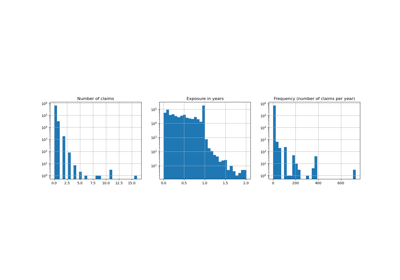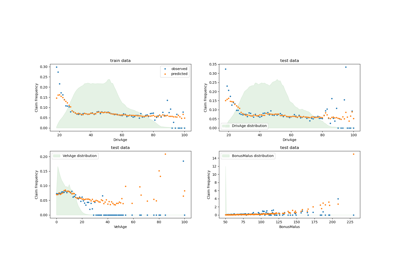DummyRegressor#
- class sklearn.dummy.DummyRegressor(*, strategy='mean', constant=None, quantile=None)[source]#
Regressor that makes predictions using simple rules.
This regressor is useful as a simple baseline to compare with other (real) regressors. Do not use it for real problems.
Read more in the User Guide.
Added in version 0.13.
- Parameters:
- strategy{“mean”, “median”, “quantile”, “constant”}, default=”mean”
Strategy to use to generate predictions.
“mean”: always predicts the mean of the training set
“median”: always predicts the median of the training set
“quantile”: always predicts a specified quantile of the training set, provided with the quantile parameter.
“constant”: always predicts a constant value that is provided by the user.
- constantint or float or array-like of shape (n_outputs,), default=None
The explicit constant as predicted by the “constant” strategy. This parameter is useful only for the “constant” strategy.
- quantilefloat in [0.0, 1.0], default=None
The quantile to predict using the “quantile” strategy. A quantile of 0.5 corresponds to the median, while 0.0 to the minimum and 1.0 to the maximum.
- Attributes:
- constant_ndarray of shape (1, n_outputs)
Mean or median or quantile of the training targets or constant value given by the user.
- n_features_in_int
Number of features seen during fit.
- feature_names_in_ndarray of shape (
n_features_in_,) Names of features seen during fit. Defined only when
Xhas feature names that are all strings.- n_outputs_int
Number of outputs.
See also
DummyClassifierClassifier that makes predictions using simple rules.
Examples
>>> import numpy as np >>> from sklearn.dummy import DummyRegressor >>> X = np.array([1.0, 2.0, 3.0, 4.0]) >>> y = np.array([2.0, 3.0, 5.0, 10.0]) >>> dummy_regr = DummyRegressor(strategy="mean") >>> dummy_regr.fit(X, y) DummyRegressor() >>> dummy_regr.predict(X) array([5., 5., 5., 5.]) >>> dummy_regr.score(X, y) 0.0
- fit(X, y, sample_weight=None)[source]#
Fit the baseline regressor.
- Parameters:
- Xarray-like of shape (n_samples, n_features)
Training data.
- yarray-like of shape (n_samples,) or (n_samples, n_outputs)
Target values.
- sample_weightarray-like of shape (n_samples,), default=None
Sample weights.
- Returns:
- selfobject
Fitted estimator.
- get_metadata_routing()[source]#
Get metadata routing of this object.
Please check User Guide on how the routing mechanism works.
- Returns:
- routingMetadataRequest
A
MetadataRequestencapsulating routing information.
- get_params(deep=True)[source]#
Get parameters for this estimator.
- Parameters:
- deepbool, default=True
If True, will return the parameters for this estimator and contained subobjects that are estimators.
- Returns:
- paramsdict
Parameter names mapped to their values.
- predict(X, return_std=False)[source]#
Perform classification on test vectors X.
- Parameters:
- Xarray-like of shape (n_samples, n_features)
Test data.
- return_stdbool, default=False
Whether to return the standard deviation of posterior prediction. All zeros in this case.
Added in version 0.20.
- Returns:
- yarray-like of shape (n_samples,) or (n_samples, n_outputs)
Predicted target values for X.
- y_stdarray-like of shape (n_samples,) or (n_samples, n_outputs)
Standard deviation of predictive distribution of query points.
- score(X, y, sample_weight=None)[source]#
Return the coefficient of determination R^2 of the prediction.
The coefficient R^2 is defined as
(1 - u/v), whereuis the residual sum of squares((y_true - y_pred) ** 2).sum()andvis the total sum of squares((y_true - y_true.mean()) ** 2).sum(). The best possible score is 1.0 and it can be negative (because the model can be arbitrarily worse). A constant model that always predicts the expected value of y, disregarding the input features, would get a R^2 score of 0.0.- Parameters:
- XNone or array-like of shape (n_samples, n_features)
Test samples. Passing None as test samples gives the same result as passing real test samples, since
DummyRegressoroperates independently of the sampled observations.- yarray-like of shape (n_samples,) or (n_samples, n_outputs)
True values for X.
- sample_weightarray-like of shape (n_samples,), default=None
Sample weights.
- Returns:
- scorefloat
R^2 of
self.predict(X)w.r.t. y.
- set_fit_request(*, sample_weight: bool | None | str = '$UNCHANGED$') DummyRegressor[source]#
Configure whether metadata should be requested to be passed to the
fitmethod.Note that this method is only relevant when this estimator is used as a sub-estimator within a meta-estimator and metadata routing is enabled with
enable_metadata_routing=True(seesklearn.set_config). Please check the User Guide on how the routing mechanism works.The options for each parameter are:
True: metadata is requested, and passed tofitif provided. The request is ignored if metadata is not provided.False: metadata is not requested and the meta-estimator will not pass it tofit.None: metadata is not requested, and the meta-estimator will raise an error if the user provides it.str: metadata should be passed to the meta-estimator with this given alias instead of the original name.
The default (
sklearn.utils.metadata_routing.UNCHANGED) retains the existing request. This allows you to change the request for some parameters and not others.Added in version 1.3.
- Parameters:
- sample_weightstr, True, False, or None, default=sklearn.utils.metadata_routing.UNCHANGED
Metadata routing for
sample_weightparameter infit.
- Returns:
- selfobject
The updated object.
- set_params(**params)[source]#
Set the parameters of this estimator.
The method works on simple estimators as well as on nested objects (such as
Pipeline). The latter have parameters of the form<component>__<parameter>so that it’s possible to update each component of a nested object.- Parameters:
- **paramsdict
Estimator parameters.
- Returns:
- selfestimator instance
Estimator instance.
- set_predict_request(*, return_std: bool | None | str = '$UNCHANGED$') DummyRegressor[source]#
Configure whether metadata should be requested to be passed to the
predictmethod.Note that this method is only relevant when this estimator is used as a sub-estimator within a meta-estimator and metadata routing is enabled with
enable_metadata_routing=True(seesklearn.set_config). Please check the User Guide on how the routing mechanism works.The options for each parameter are:
True: metadata is requested, and passed topredictif provided. The request is ignored if metadata is not provided.False: metadata is not requested and the meta-estimator will not pass it topredict.None: metadata is not requested, and the meta-estimator will raise an error if the user provides it.str: metadata should be passed to the meta-estimator with this given alias instead of the original name.
The default (
sklearn.utils.metadata_routing.UNCHANGED) retains the existing request. This allows you to change the request for some parameters and not others.Added in version 1.3.
- Parameters:
- return_stdstr, True, False, or None, default=sklearn.utils.metadata_routing.UNCHANGED
Metadata routing for
return_stdparameter inpredict.
- Returns:
- selfobject
The updated object.
- set_score_request(*, sample_weight: bool | None | str = '$UNCHANGED$') DummyRegressor[source]#
Configure whether metadata should be requested to be passed to the
scoremethod.Note that this method is only relevant when this estimator is used as a sub-estimator within a meta-estimator and metadata routing is enabled with
enable_metadata_routing=True(seesklearn.set_config). Please check the User Guide on how the routing mechanism works.The options for each parameter are:
True: metadata is requested, and passed toscoreif provided. The request is ignored if metadata is not provided.False: metadata is not requested and the meta-estimator will not pass it toscore.None: metadata is not requested, and the meta-estimator will raise an error if the user provides it.str: metadata should be passed to the meta-estimator with this given alias instead of the original name.
The default (
sklearn.utils.metadata_routing.UNCHANGED) retains the existing request. This allows you to change the request for some parameters and not others.Added in version 1.3.
- Parameters:
- sample_weightstr, True, False, or None, default=sklearn.utils.metadata_routing.UNCHANGED
Metadata routing for
sample_weightparameter inscore.
- Returns:
- selfobject
The updated object.

